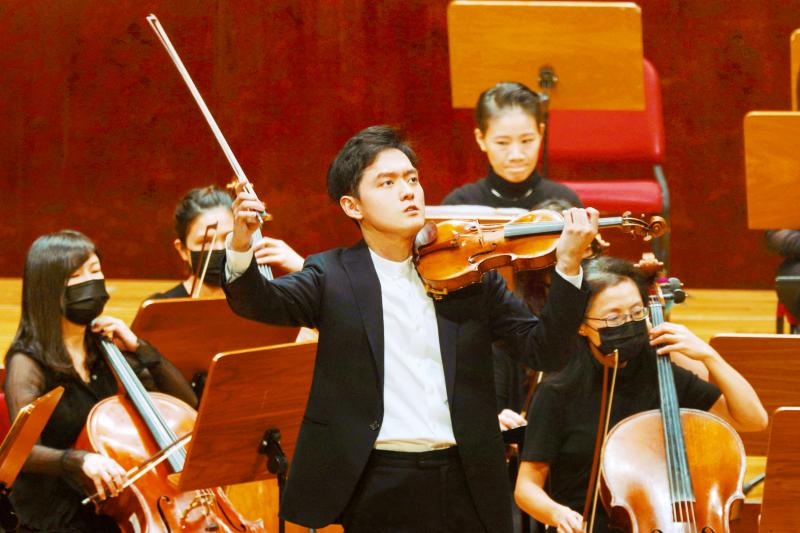Recently, veganism has been steadily gaining steam. This lifestyle choice __1__the use of animal-based products, especially when it comes to one’s diet and clothing. However, animal products are used in such a wide range of __2__ that living as a true vegan can prove to be a difficult challenge for many people.
Those who play the violin, for example, have traditionally had no __3__ but to use instruments that rely heavily on glues made from the skin, bones, and tendons of animals to hold them together. Fortunately for these vegan musicians, however, this is no longer the case.
Padraig O’Dubhlaoidh, an Irish violin maker, recently made the first violin to be __4__ with The Vegan Society’s “Vegan Trademark.” He created the NT$300,000 instrument at his workshop in the Malvern Hills district of England during the coronavirus lockdown. According to O’Dubhlaoidh, a customer had __5__ him about making a vegan instrument a number of years ago. The craftsman had long thought that animal products were not necessary to build a violin. Moreover, he was troubled by the thought of the __6__ dilemma that some vegan musicians faced when they were forced to play instruments that were not vegan-friendly. Therefore, he set about making a violin that was free from materials such as horsehair, hooves, horns, or bones, animal products that have historically been used in the __7__ of violins.

Photo courtesy of MNA 照片:牛耳藝術提供
O’Dubhlaoidh’s vegan-friendly violin uses glue made from wild berries and spring water rather than traditional materials that are __8__ from animals. He even claims that the acoustic properties of his vegan violin are better than __9__ models. This is mainly because the glue he uses causes less tension on the wooden __10__ of the instrument. He’s certain that eco-friendly instruments like the one he has created will become more common in the coming years.
近來,素食主義一直穩定地越來越受歡迎。這種生活方式的選擇排除使用以動物為主要成分的製品,在飲食和衣服方面尤其如此。然而,動物製品被用於如此廣泛的商品中,以至於對許多人來說,要作為真正的嚴守素食主義者生活著可能是一項艱鉅的挑戰。
舉例來說,傳統上那些拉小提琴的人別無選擇,他們只能使用重度依賴動物皮膚、骨骼和肌腱製成的膠水將它們固定在一起的樂器。然而幸運的是,對於這些純素音樂家來說,情況已不再如此。
愛爾蘭小提琴工匠保利.奧杜力最近製造了第一把在素食協會註冊「純素商標」的小提琴。在冠狀病毒流行期間處於封城狀態時,他在英格蘭莫爾文希爾斯區的工作室創造了這把價值新臺幣三十萬的樂器。據奧杜力的說法,幾年前,一位客戶曾來找他,要他製作純素樂器。這位工匠一直認為動物製品不是製造小提琴所必需的。此外,他對一些純素音樂家面臨的道德困境感到不安,因為他們不得不演奏對嚴守素食主義者不友善的樂器。因此,他著手製作一種沒有使用馬毛、蹄、角或骨頭等原料的小提琴,這些動物製品是過去用來製作小提琴的原料。
奧杜力為嚴守素食主義者製作的小提琴,使用了由野生漿果和泉水製成的膠水,而非使用取材於動物的傳統原料。他甚至聲稱他的純素小提琴聲音特性比傳統的型號更好。這主要是因為他使用的膠水對樂器木頭的部分造成的拉力較小。他確信,像他創造的這種環保樂器將在未來幾年變得更加普遍。
----------
What Did You Learn?
(A) conventional (B) moral (C) production (D) excludes (E) sourced
(F) components (G) goods (H) approached (I) option (J) registered
答案:
1. (D) 2. (G) 3. (I) 4. (J) 5. (H)
6. (B) 7. (C) 8. (E) 9. (A) 10. (F)
----------
Words in Use
1. steadily adv. 穩定地,不斷地
Due to global warming, temperatures around the world are steadily increasing.
2. -based suffix (形容詞詞尾)以…為主的
This is a garlic-based sauce.
這種醬是以蒜頭為主要成分。
3. fortunately adv. 幸運地,所幸
= luckily adv.
I lost all of my money. Fortunately, Mary was willing to lend me some.
我的錢全搞丟了,所幸瑪莉願意借我一些錢。
4. district n. 地區,區域
Do you know which district of the city Tina lives in?
你知道蒂娜住在這座城市的哪一區嗎?
5. dilemma n. 左右為難,困境
Our dilemma is how to exploit natural resources without damaging the environment.
我們的難題是如何開發天然資源而又不傷害到環境。
Practical Phrases
1. gain / gather / pick up / get up steam 越來越受歡迎;加大馬力
After a week, the fundraising project began to gain steam.
一週後,籌款活動開始變得熱絡起來。
2. a wide range of... 範圍廣泛的…
Our new chef has created a wide range of new dishes.
我們的新廚師已經研發出各式各樣的新菜色。
3. rely on... 依賴… = depend on...
Benny had to rely on the MRT to get to work after he sold his car.
班尼把車子賣掉後,他必須靠搭捷運上班。
4. hold... together / hold together
使連在一起
Jenny used glue to hold these two pieces of paper together.
珍妮用膠水把這兩張紙黏起來。
5. set about 著手做
Ray set about cleaning up the house after the party.
派對後,小雷著手清理房子。
聽文章朗讀及講解: https://ivy.pse.is/455bfu
本文出自常春藤解析英語雜誌: www.ivy.com.tw

As the priest Antonius Hambroek stood in the dim chamber of Fort Zeelandia, his eldest daughter clung to him, her voice trembling. “Father, don’t go. They’ll kill you, and what will become of Mother and my sisters?” Outside, the sounds of Koxinga’s relentless canon siege boomed through the fortress. The defenders were on the brink of collapse. Starvation gnawed at their resolve, and the air carried the acrid stench of spent gunpowder and rotting flesh. Dutch reinforcements from Batavia had failed to arrive, leaving the garrison isolated and hopeless. Hambroek’s face was calm, though sorrow weighed heavily on his

The Dutch introduced the Indian mango (Mangifera indica) to Taiwan in the 17th century. It is a green-skinned mango with thick fibers that get stuck in the teeth, but it boasts a rich aroma and a unique taste. In 1954, Taiwan’s Council of Agriculture introduced several mango cultivars from Florida, USA, including the Irwin, Haden, and Keitt varieties. After seven years of testing and domestication, the Irwin variety was chosen for promotion. Years later, the sample saplings started to bear fruit. These mangoes were large, with thin, vibrant red peels and golden pulp. The Irwin mangoes were mouth-wateringly sweet and

對話 Dialogue 清清:今天中午我要多吃一點,不然晚上可能會吃不飽。 Qīngqing: Jīntiān zhōngwǔ wǒ yào duō chī yìdiǎn, bùrán wǎnshàng kěnéng huì chībùbǎo. 華華:怎麼了?為什麼會吃不飽? Huáhua: Zěnmele? Wèishénme huì chībùbǎo? 清清:今天大年初七,是「人日節」,傳統上結了婚的女兒要回家給父母送長壽麵,而且最好是素的,我姐姐會回來,只吃素麵,我應該很快就餓了。 Qīngqing: Jīntiān Dànián chūqī, shì “Rénrì jié,” chuántǒng shàng jiéle hūn de nǚ’ér yào huíjiā gěi fùmǔ sòng chángshòumiàn, érqiě zuìhǎo shì sù de, wǒ jiějie huì huílái, zhǐ chī sùmiàn, wǒ yīnggāi hěn kuài jiù èle. 華華:我還是第一次聽說有「人日節」呢!這是怎麼來的啊? Huáhua: Wǒ háishì dì yī cì tīngshuō yǒu “Rénrì jié” ne! Zhè shì zěnme lái de a? 清清:老一輩的人說,女媧是在第七天造出了「人」,所以今天可說是我們每個人的「生日」呢!生日快樂! Qīngqing: Lǎoyíbèi de rén shuō, Nǚwā shì zài dì qī tiān zào chūle “rén,” suǒyǐ jīntiān kěshuōshì wǒmen měi ge rén de “shēngrì” ne! Shēngrì kuàilè! 華華:你也是啊!欸?那前六天女媧都做了什麼呢? Huáhua: Nǐ yěshì a! Éi? Nà

As we bundle up in thick coats to stay warm during the winter, there is a population that has already adapted to extremely low temperatures. These people live in the remote city of Yakutsk, the coldest city on Earth. Yakutsk is situated in the heart of Siberia, which is the capital of the Sakha Republic in Russia. This historic mining city began to flourish in the 19th century following the discovery of gold deposits. Given its construction on permafrost, the average temperature in the city remains below 0°C for over half the year, with winter temperatures dropping to an astonishing -50°C.